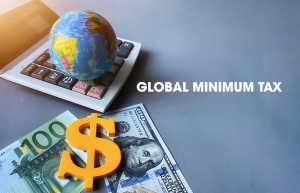Preparations for a GMT overhaul
Companies or organisations that are part of a multinational corporation, or any permanent establishment of a company or organisation belonging to a multinational group, now have to take under consideration the new global minimum tax (GMT) regime. For the previous four fiscal years, the ultimate parent company must have at least two years of consolidated financial statements with revenue equal to or greater than €750 million (around $813.14 million) unless certain exceptions apply.
 |
| Le Khanh Lam, chairman of RSM Vietnam |
With the decisions issued this year, any multinationals making new investments in the country will be subject to the same laws as before, along with the newly ratified resolution. It means that new foreign investors will still receive tax reduction incentives initially but will have to repay these incentives later.
Vietnam faces a significant challenge and opportunity with introducing the GMT. Tax evasion and transfer pricing were substantial problems in the past, but now they must be addressed as part of the legal implementation of this global tax mechanism.
Despite these challenges, Vietnam remains an attractive destination for investors due to its many advantages. However, the country must also address other issues such as compliance, infrastructure, administrative procedures, labour productivity, education, and skills. Vietnam may take advantage of this opportunity to consider using tax incentives and improve its investment policy framework. Doing so will help the country maintain its position as a desirable long-term destination, particularly for multinational groups.
We may incorporate experiences from various countries to develop our mechanism for encouraging green and circular projects. For instance, Malaysia is considering using cash grants to continue attracting and retaining foreign investors. Indonesia has a system whereby it sells carbon quotas to entities that have excessive greenhouse gas emissions. If such a scheme is approved and implemented, it could hurt Vietnam’s investment environment.
Other countries, including China, Singapore, and Malaysia, commonly offer expenditure-based incentives such as super expense deductions for research and development activities and intellectual property registration to encourage diversification and substantial investment activities. To ensure a broader response from investors, it would be beneficial to refer to international experiences from developed countries and Southeast Asian members.
Taking advantage
According to an expert survey, out of 100 Japanese investors, 65 have expressed their willingness to expand production in Vietnam. The survey also reveals that foreign investors prefer to continue operating within Vietnam’s borders if they decide to move production. Only some are interested in relocating to other countries. China, India, and Indonesia are the only countries that investors consider apart from Vietnam.
Typically, multinational companies do not solely rely on tax incentives to decide whether or not to invest in a developing country. Research from the World Bank and other sources indicates that factors such as cost, labour quality, infrastructure quality, and the business environment’s openness are all considered before investing. Vietnam’s incentive policies on corporate income tax (CIT) to attract overseas funding are considered attractive compared to other countries in the region, which makes the country a capital magnet.
The Law on Investment 2020 has introduced support and incentive policies. These support policies include the development of technical and social infrastructure systems for the venture, credit support, training, and human resource development, providing access to production and business premises, supporting production and business establishments to relocate, scientific, technical, and technology transfer support, market development and information provision, and research and development support. However, these policies have yet to be widely implemented.
To minimise the negative impact on foreign investment, Vietnam should implement cost-based incentive policies to assist businesses affected by Pillar 2 and benefiting from tax incentives. Vietnamese regulations on CIT incentives are not extensive and primarily focus on income-based incentives such as tax exemptions and incentives. Cost-based incentives, specifically cash grants, still need to be widely available.
When specific policies need to be introduced to compensate affected businesses, the competent authorities can focus on developing detailed regulations to apply these support policies. It is challenging to make amendments when the National Assembly passes the law. Thus, companies should contribute their opinions, ensuring the government has diverse perspectives.
The principle of fair treatment is essential in an investment support policy. It means that both foreign-invested and Vietnamese enterprises in specific fields will receive equal support. In other words, regardless of whether they pay below or above 15 per cent in tax, domestic businesses will have an equal opportunity to receive support under the non-discriminatory treatment principle.
Suppose Vietnam can adopt an effective tax system while learning from other countries. In that case, it can capitalise on its strengths, such as a large market of 100 million people, with 25-30 million belonging to the middle class, successful inflation control, and political and economic stability. It presents an excellent opportunity for growth.
The implementation of such support measures will require better state administrative capability. However, in return, Vietnam can select specific targets and address existing issues, creating an excellent opportunity to draw in investment more selectively, which can result in higher efficiency.
Recommendations for businesses
As Vietnam embraces the global shift towards a minimum tax framework, multinationals operating within the country must adapt to the evolving international tax landscape. Some essential recommendations for companies in Vietnam to effectively navigate and comply with the GMT regulations are required.
Firstly, one of the essential steps for businesses is evaluating the current tax structure, which includes a thorough assessment of the existing tax strategies to identify potential areas of non-compliance and ensure alignment with the GMT requirements.
To ensure compliance with evolving regulations, businesses should stay informed to keep updates and changes to the GMT framework. Identifying applicable thresholds can help enterprises determine whether companies fall under the purview of the GMT regime.
Seeking professional advice is also necessary to help companies collaborate with experienced tax professionals to navigate the complexities of GMT compliance and develop effective tax strategies tailored to the business’s unique circumstances. Based on the tax experts, companies can more easily identify available incentives and deductions within the Vietnamese tax system to optimise tax planning and minimise the impact of the GMT.
Additionally, it is crucial to ensure arm’s length pricing. Businesses should review and adjust transfer pricing policies to align with the GMT regulations, ensuring transactions between related entities are conducted at arm’s length. Furthermore, maintaining robust documentation by strengthening record-keeping practices to provide transparent documentation of financial transactions and helping demonstrate compliance with GMT regulations plays an important role.
Corporate owners should understand how GMT rates may affect cross-border transactions and adjust their strategy accordingly to minimise potential adverse consequences. This step requires companies to comply with reporting obligations related to the GMT framework and ensure the timely submission of accurate information to relevant authorities.
Finally, businesses should monitor any modifications to tax treaties between Vietnam and other jurisdictions, as these changes may impact the GMT obligations. Establishing robust internal controls will help them to ensure compliance with GMT regulations, reducing the risk of audits and penalties.
 | Vietnam races to stay competitive with new GMT The international community is speeding towards the implementation of a global minimum tax, and Vietnam is no exception. With countries around the world revamping their tax systems, Vietnam must also navigate this new landscape in order to stay competitive and draw in new foreign investment. |
 | Mission now clear in journey to adapt to GMT rate Now could be a good time for Vietnam to review investment incentives and raise diversified policies in line with international practices. |
What the stars mean:
★ Poor ★ ★ Promising ★★★ Good ★★★★ Very good ★★★★★ Exceptional
Related Contents
Latest News
More News
- Potential is substantial for the electric vehicle industry (December 27, 2023 | 11:34)
- Implementation of the circular economy in Vietnam (November 13, 2023 | 11:30)
- Banking’s development in data and digitalisation era (November 07, 2023 | 15:24)
- ESG enabling real estate businesses to attain funds (June 16, 2023 | 15:25)
- RSM Vietnam stays ahead of the changing business environment (March 14, 2023 | 10:07)
- What might the Vietnamese economy look like in 2023? (January 02, 2023 | 21:37)
- Neobanking: a trend-setting model for the digital revolution (December 19, 2022 | 14:30)
- Evaluating the prospects of M&A upswings next year (November 28, 2022 | 08:00)
- RSM Vietnam celebrates opening new office in Ho Chi Minh City (September 20, 2022 | 19:29)
- RSM Vietnam taking advantage of central region recovery to expand operations (September 19, 2022 | 08:00)

 Tag:
Tag:














 Mobile Version
Mobile Version